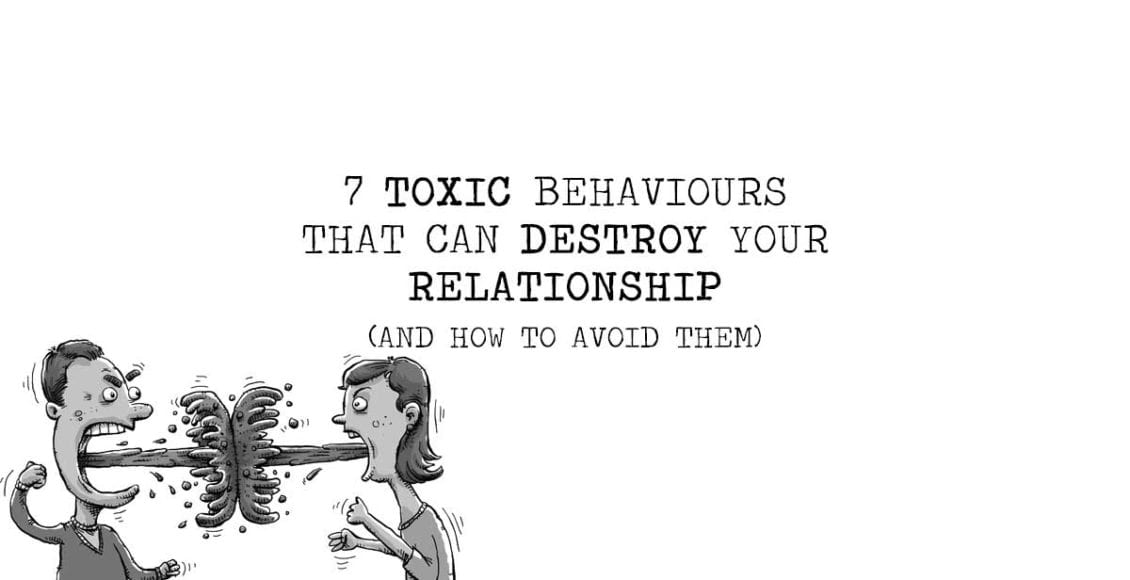Knowing which behaviours are toxic and how to avoid making these mistakes, can save your relationship from unnecessary hardships.
All relationships have their problems, and some are easier to work through than others. But if you really want to keep the love alive between you, avoid these 7 toxic behaviours.
1. Responding irrationally to feedback, instead of hearing them out.
Communication is an essential part of any relationship. If you can communicate clearly and openly, most of your problems in the relationship should be resolved easily.
Perhaps you have forgotten to pay the bills on time, or the things you said you would do, haven’t been done. If your partner reaches out to you and mentions these things, instead of getting angry and responding irrationally, hear them out. They are coming to you with these problems because they notice something isn’t quite right, and they care.
Responding irrationally can be caused by several things, like stress, worry, or simply feeling overwhelmed with all the things you must do. But that’s what are partners are there for- to share our burdens with us. First, we need to create an open dialogue with our partner so they know they can come to us in the future if any issues arise. Then, we need to remember that it’s not a personal attack if they come to us with a problem, they are just trying to help.
2. Not considering your partner when making plans, or financial decisions.
If you act like there is only one person in your relationship, then it won’t be too long before that becomes a reality.
Being in a healthy relationship requires consideration for the other person. This doesn’t mean you need “approval,” but rather that discussions should be held when making plans or important decisions. If you can’t discuss it at that moment, then think about how your choices would make them feel.
If you know they are saving money to go back to school, and you happen to see a new TV you would love to have, thinking about their needs and discussing the matter will benefit you both in the long run.
3. Being codependent.
We all want to be near those we love, but there comes a point when it can border on codependency.
If you don’t have your own friends, hobbies, likes and dislikes, then your partner is essentially in a relationship with themselves, and that isn’t going to last very long. It can become suffocating to be around someone 100% of the time, regardless of how much you love them.
Dr. Seth Myers writes on Psychology Today, “In a push to fuse with their partner, some people will forget about their own interests, hobbies and goals—things that may have attracted their partners in the first place. To break codependency’s false bond, make a list of how and with whom you spent your free time prior to your relationship—a worthwhile exercise. Try monitoring the amount of alone time you have, as no couple should be spending all their free time together. Pursue an activity on your own, such as going to the gym or take a fun class at your local community college. If you’ve lost touch with friends you genuinely care about in favor of spending time almost exclusively with your partner, regain your identify by making an effort to meet a friend or two for an activity or a meal.”
4. Continuously picking a fight.
It might not be intentional, but always nagging your partner about little things will eventually cause fights between you.
We all have our flaws, and being in a relationship with someone helps to illuminate them. However much it might annoy you that they left their socks on the floor (again), is it really worth an argument? Learn to pick your battles wisely, and your relationship will last much longer.
5. Not being honest.
Honesty doesn’t just mean telling the truth. It also means having your actions match your words, and being clear about your feelings.
Dr. Lisa Firestone writes, “Honesty in a relationship can be tricky because it doesn’t mean saying every little critical thing to our partner that pops into our head. We have to know our real intentions and what our real truth is. This means we have to know ourselves. We have to consistently ask ourselves, “Am I being honest? What’s my motivation? Do my words and actions really match?” If we say we really love someone, there should be actions we take that, to an outside observer, would be viewed as loving.”
“When our actions are honest, we can create genuine closeness.”
Making a relationship work isn’t always easy, but if you put effort into it, and keep these points in mind, it should be much easier.



